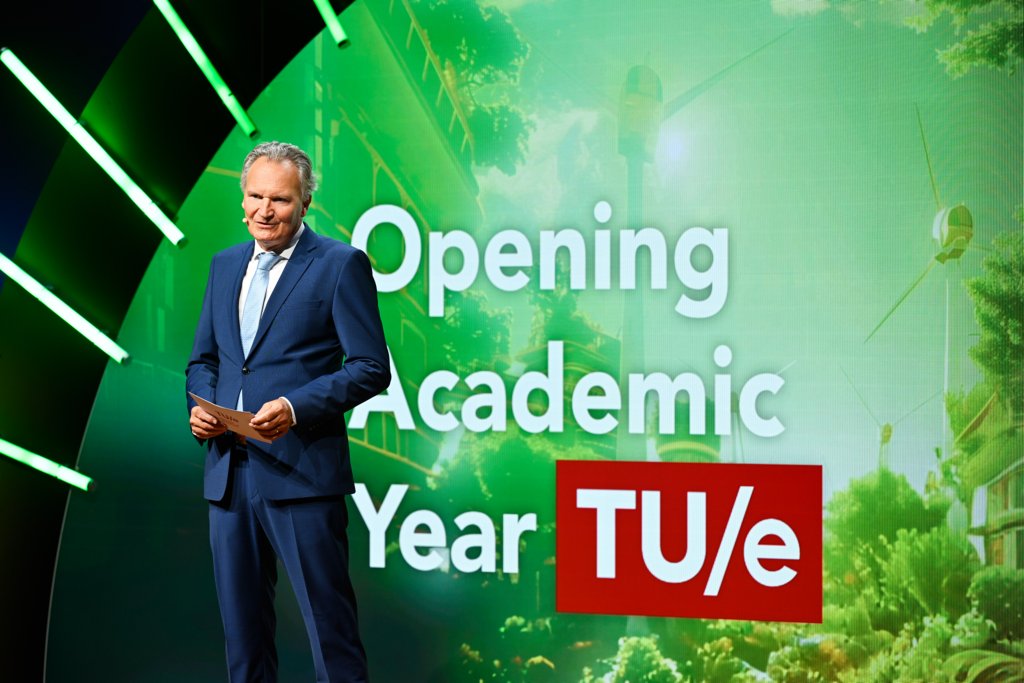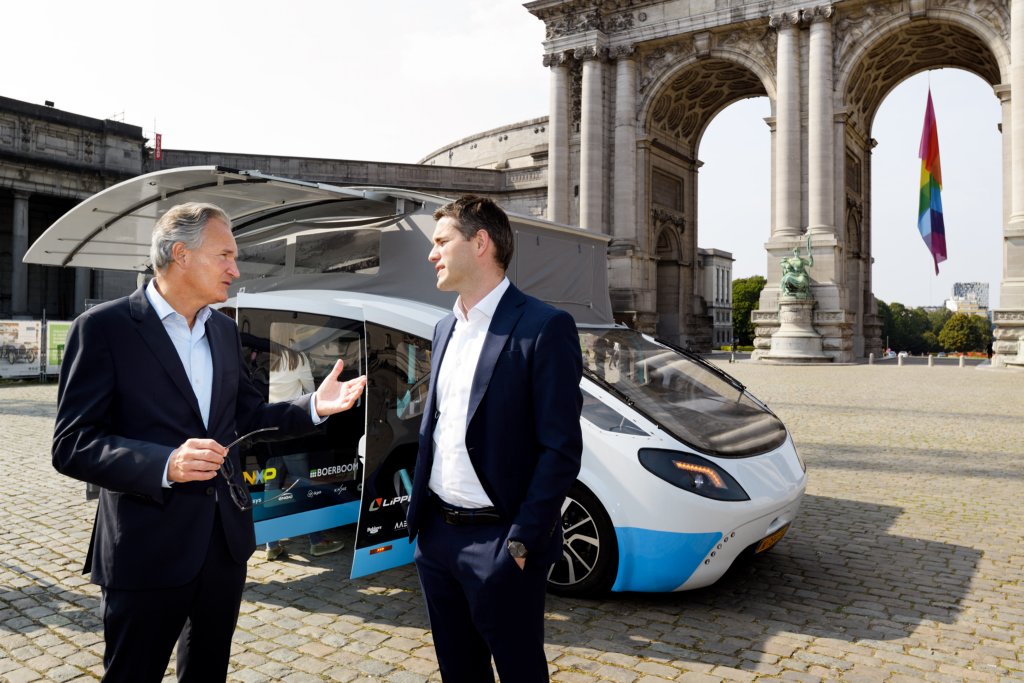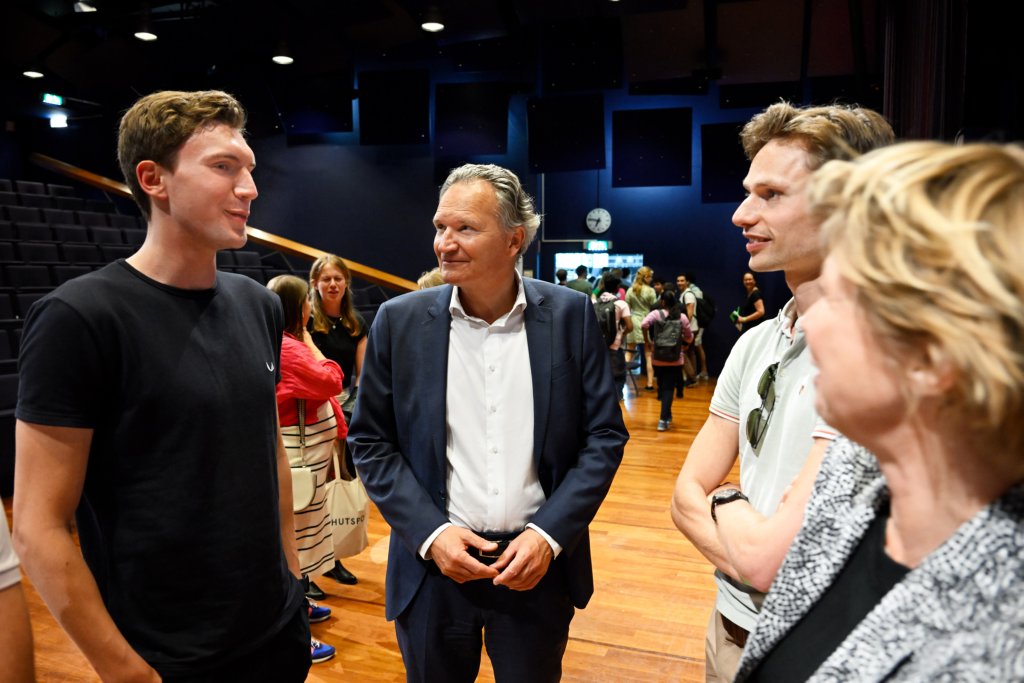After almost six years, Robert-Jan Smits will step down as President of the Executive Board of TU Eindhoven (TU/e). Looking back on wonderful years during which the university raised its profile and grew despite budget cuts, he also saw positive developments within the 4TU Federation. But progress could be faster. "Dare to make decisions via smart specialisation. See to it that as 4TU, you are an example to others."
Interview: Nienke Beintema
Robert-Jan thinks his roots in the province of Brabant have helped, especially in Eindhoven: it opens doors to companies and institutions and thus to 'the real world'. The latter is a priority to Robert-Jan Smits, who will soon step down as President of the TU/e Executive Board: a university should be at the heart of society, offering solutions to societal issues.
He is alluding to, among others, the so-called 'Project Beethoven', in which the national government has earmarked 2.51 billion euros in the coming years for education, knowledge development and infrastructure in the Brainport Eindhoven technology region. Semicon (semiconductor industry) will play a central role in this. "Thanks to these investments, TU/e can continue to grow in a climate where fellow universities are, in fact, struggling."
Did you play a role in that growth, as President of the Executive Board?
"Yes, definitely! When I started here, TU/e's policy was: let's not invest in growth. It was understandable back then, but at that very moment, the region decided to jump in scale to stay ahead internationally. Governing bodies in The Hague wanted to facilitate that and asked us: Do you want to participate? I immediately said yes, we should, and it was widely supported within the university. Our motto became: educate more students, attract more foreign talent, and enable more cooperation with the high-tech industry. And all in partnership with the regional MBO and HBO."
You wanted the university to grow, but in conjunction with the region?
"Yes. This university was founded almost 70 years ago at the request of Philips. The company DNA of entrepreneurship and innovation is still in our genes. We consider this in our approach to everything we do. How can we do this with the region? We participate in initiatives like Glow Festival and Dutch Design Week. We collaborate a lot with companies. Regarding the latter, we score in the global top. We have the highest 'stay rate' worldwide: over 60 per cent of our international graduates find a job in this region, and 80 per cent of the engineers in Brainport are TU/e alumni. That is much higher than elsewhere. I am very proud of that, too."
Before this, you worked for the European Commission, which is very internationally oriented. Isn't that a contradiction?
Colleagues from Brussels visited and asked: how do they do it over there in Eindhoven? I always knew this was a special part of the Netherlands, but when I started working at TU/e, I fully realised how well the Brainport region operates."
Isn't it difficult to pass the baton now?
"Not at all because my work here is done. I see the current six-year TU/e Institution Plan (2019-2025) as 'my' strategic agenda. It is now up to my successor to make their mark on the next Institutional Plan. It’s going to be absolutely fine because I have a fantastic successor in Koen Janssen. He will definitely emphasise different aspects, which is only right."
How were you involved with the 4TU Federation?
"I was on the Executive Board of 4TU. That was very valuable, because of the great colleagues. In our meetings, we discuss cooperation, challenges and successes in business and also share experiences as colleagues. Extremely useful!"
In your opinion, what has 4TU achieved in recent years?
"The biggest achievement has undoubtedly been positioning engineering at the political level. Thanks to 4TU, the importance of engineering has been promoted nationally in recent years. Leading to, among other things, the exemption position for engineering study programmes regarding the Internationalisation in Balance Act, the WIB. 4TU played a major role in this. We unanimously said: we need science, technology and engineering people, even from beyond national borders."
What other merits of 4TU do you see?
"The Federation has also played an important role in drafting the national engineering agenda, including priorities aligned with those of 4TU. Establishing the Netherlands Academy of Engineering, the NAE, is also a crowning achievement. And of course, we have all those wonderful 4TU Centres. Which ones do I find especially important? They are all important. I want to mention one established on the TU/e's initiative: the Centre for History of Technology. Surely, that is unique. I am not an engineer myself, and it is important that we not only look to the future, something engineers are very good at because of their profession, but also ask ourselves: What have we delivered in the past? Take the Delta Works, for example, or the Afsluitdijk, which are both great achievements by Dutch engineers. What can we learn from them? We must reflect on this to be agile and meet society's needs. It is unique that 4TU has now embedded this in a Centre."
And at the same time, there is always a focus on the future.
But engineers will still have to master the technical basics as well?
"That's the question," Smits says with a mischievous smile. "I recently proposed the following: as a trial, let's train a group of students solely in using AI, to design their own curriculum - again, based on AI. And then see what happens. That could be very exciting. I think right now, we’re underestimating our students. They already know their way around the digital world and AI. We need to move away from that dated concept of a single teacher in front of a group. Above all, we need to teach students how to use AI responsibly. And the ethical aspects involved."
Can 4TU make a difference in that area?
"It is 4TU's role to lead the way with experiments like that, and it does already happen, for example, through the 4TU Centre for Engineering Education."
And what about cooperation with Defence? You hear a lot about that lately.
"I recently presented the TU/e 'smart reserve' initiative to identify where the four TUs can play a role in strengthening our national security so that we can quickly share available knowledge in a crisis. Of course, we are also looking at the moral aspects of this."
So, what's next?
"I will devote more time to several supervisory positions. For instance, I am already on the Supervisory Board of Naturalis, where I will become the chairman. I will also continue for another year on the board of the National Growth Fund, where, unfortunately, a lot of money has been taken out. I have also taken on a few advisory positions, including in Iceland, Cyprus and Germany. I no longer have responsibility for big budgets or lots of staff, that’s something I’ve put an end to. I’m returning to policy consultancy: how can the government effectively and efficiently steer research and innovation? How to ensure that policy also translates well into action and is dynamic? How do you make policy transparent? And, as always, my main focus is on how society will benefit. All incredibly interesting."
Are there any things you would like to pass on to your 4TU colleagues?
"First of all, a big thank you! Of course, also to Marjolein (Dohmen-Janssen, secretary of 4TU, ed.) and her team, who tirelessly organise everything and keep it running smoothly in the right direction. But if I can give a tip: smart specialisation. We should concentrate more on specific focal areas. For example, in Eindhoven, we choose Semicon, and Wageningen chooses agriculture. 4TU can lead the way with smart specialisation. Strategic choices can efficiently establish large equipment at a location and set up the competencies that go with it. Currently, in the Netherlands, this is often still too fragmented. Other than that, I would tell my 4TU colleagues: keep up the good work."
Translation text: Helen Hartmann








